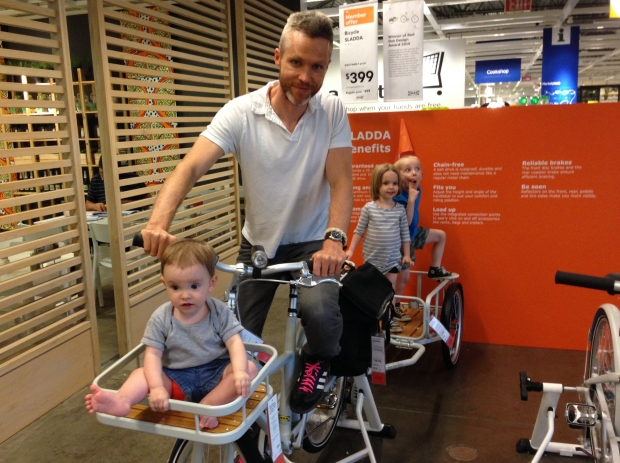by MaryBeth
Last week marked one of the biggest milestones in my life: I began medical school. But as I referenced in previous posts, this was not the only big change my family went through in the last month. My youngest of three just turned ONE and her sassy big sister turned three (see adorable birthday balloon above). With my baby daughter starting daycare for the first time after a year at home, I felt an unusual amount of anxiety leading up to this major transition. So much so that, over the last two months, I believe I’ve even experienced a few episodes that could be categorized as panic attacks. Turns out, just because you don’t realize how nervous and anxious you are on a conscious level, doesn’t mean you can avoid a physical reckoning! It’s definitely too early for me to self-diagnose with any degree of certainty, but let’s just say that identifying the issue and working to address it has already improved my daily life.
Speaking of…. my daily life now involves studying hard and working with some awesome peers at Dell Medical School in Austin, Texas. Our workload at the moment is incredibly diverse, which helps keep things interesting. Prep for a typical class day might involve reading a study on social determinants of health, watching a video comparing the costs and risks of different radiological tests, or exploring a relevant clinical case with a team of other students. We are definitely not lacking for material!
I’ll share more about Dell Med’s novel curriculum in a future post. For now, I’d like to impart a few things I learned about self-care during orientation and in my first two weeks of med school. These are things you may already know, but maybe reading about it again will help you make a small change that you wouldn’t have made otherwise!
My current strategies for coping with med school and family stress:
- Take time for meditation/reflection – I finally subscribed to an app called Headspace (you can check out a free pack of 10 meditations just by registering) and have been pretty good about meditating at school or at home to give myself a much-needed mental break.
- Bring plenty of healthy (and tasty!) food – I planned out a weekly grocery list and meal plan, including hearty snacks, so that I always have the best kind of fuel available at school or home.
- Find mundane activities that offer complete satisfaction – if there’s one thing I’m already learning about med school, it’s that you’ll never be able to do/learn EVERYTHING for every class. So it’s helpful to use your off time for tasks that are guaranteed to bring you that slice of satisfaction that you might not get at the end of your study session. Example: this morning I vacuumed and straightened my house so that I could come home and enjoy a clean space. Baths with your favorite music playing are another great option 🙂
- Smile. You know how they say that if you smile more, you actually start to feel happier? Well, in my first two weeks at school, I’ve found myself smiling at my new classmates and friends A LOT. And without realizing it at first, I think all of that smiling has generally kept my spirits up even through some stress and anxiety. As we all get more familiar, it’s likely that the smiling will gradually decrease, but it certainly won’t hurt to try and keep it up.
Best of luck to everyone who is applying this cycle! I’ll try and post again soon with more updates on how school is going.

With three kiddos under 5, it’s nearly impossible to get a pic where everyone cooperates!!




 I’m MaryBeth and I live in Austin, Texas with my husband of seven years. My undergrad and Master’s degrees are both in advertising and, as of 2011, I envisioned myself working in health communication. I had my first baby, my son Torsten, in 2013 while working for an Austin tech startup (needless to say, short maternity leave). More on being a working/pumping mom of a colicky baby later.
I’m MaryBeth and I live in Austin, Texas with my husband of seven years. My undergrad and Master’s degrees are both in advertising and, as of 2011, I envisioned myself working in health communication. I had my first baby, my son Torsten, in 2013 while working for an Austin tech startup (needless to say, short maternity leave). More on being a working/pumping mom of a colicky baby later.